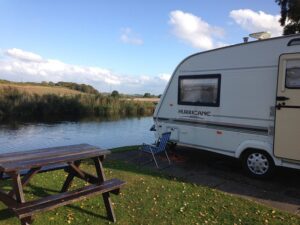
Buying a static caravan and creating your own home away from home is appealing to many of us. Who wouldn’t want a place to escape to and relax? If you’re thinking about taking the leap and becoming a caravan owner, be mindful not to overlook insulation and security when you’re looking at different options.
If you overlook insulation and security, it can impact the comfort, safety, and energy efficiency of your caravan.
In this guide, we’ll show you why effective insulation and reliable security measures shouldn’t be ignored. You’ll find easy-to-follow tips to make sure your new caravan is warm, secure, and efficient all year round, so you can relax.
Why are insulation and security important for caravan owners?
Caravans aren’t cheap. So, when you purchase a caravan, you’re probably counting on enjoying as many trips as possible. But having a poorly insulated or insecure caravan puts those happy memories at risk.
Firstly, poor insulation can make for an uncomfortable caravan stay, with temperatures fluctuating and condensation building, the chill will certainly put a dampener on things.
Secondly, if you have windows and doors with loose or broken locks, you’re putting yourself at greater risk from theft and damage. Poor insulation and security can both result in unexpected costs; whether it’s higher energy costs or fixes due to attempted break-ins.
Effective insulation and security measures help to:
- Keep your caravan warm and homely
- Cut your energy bills and have less environmental impact
- Prevent condensation and mould from taking hold
- Keep your belongings protected and give peace of mind
Signs your caravan needs better insulation and security
If you’re looking to buy a caravan, or you’ve recently purchased one, check for these signs that can indicate potential problems with insulation and security that will need fixing quickly:
Insulation problems: A checklist
- You can feel cold draughts around windows and doors
- Your caravan frequently suffers from build-ups of moisture and condensation
- You notice that the temperature drops quickly inside your caravan
- The cost of heating is considerably high
Security concerns: A checklist
- Your window and door locks are loose
- Your doors or windows don’t close securely
- Signs of forced entry or attempted break-ins
- The window hinges, locks, or frames are damaged
TOP TIP: Our caravan window maintenance tips can help you catch common problems early and keep your windows in shape.
Easy ways to make your caravan cosier and more secure
Want to make your static caravan feel warmer and safer, you absolutely can! Here are some things you can do to improve the insulation and security:
How to keep your caravan warm:
- Upgrade your windows: Ok, so swapping old windows for double glazing is a bigger job, but it does make a difference! Having double glazing in your caravan will keep the heat in much better and can even lower your heating costs.
- Cosy curtains & blinds: Hang up some thick thermal curtains or invest in insulated blinds. They act like a warm blanket for your windows, holding heat in and keeping chilly draughts out.
- Try window insulation film: It’s an affordable sticky film you put on your windows that adds an extra layer of insulation. Easy to do but surprisingly effective.
- Seal the gaps: Take a look at the rubber seals around your windows and doors. If they’re cracked, worn, or peeling, replace them! It stops heat from escaping and also helps to keep damp away.
- Beat the draughts: Grab some draught-proofing strips (they’re cheap and easy to find). Stick them around window frames and door frames where you feel cold air coming through.
Boosting your caravan’s security:
- Lock check: Regularly give your window and door locks a quick test. Do they lock smoothly and feel secure? If any seem stiff, loose, or damaged, get them replaced straight away.
- Add extra safety measures: Add things like window restrictors (so windows only open a little), sturdy door chains, or even a simple battery-powered alarm to put off anyone thinking of trying their luck.
- Keep hinges & frames strong: Check that hinges and frames are solid and not damaged or rotten. Fix up any weak spots you find.
Your static caravan should be a place of comfort, security, and peace of mind; somewhere you can truly relax. By making smart choices around insulation and security, you’ll not only create a cosier, safer space, but also protect your investment and avoid costly issues down the line.
So, whether you’re upgrading an older model or buying your first static caravan, don’t overlook the condition of your windows and doors.
At Cloudy2Clear, we specialise in static caravan window repairs and replacements that improve both insulation and security.
Our team can assess your caravan windows for issues like condensation, draughts, or damaged locks, and advise a cost-effective solution that fits your needs.
Get in touch today for your free, no-obligation quote and enjoy a warmer, safer caravan all year round.
